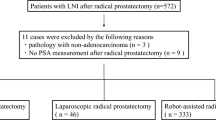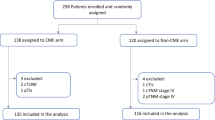Abstract
Background
The aim of this study was to elucidate the risk factors for and prognostic value of lateral pelvic lymph node (LPLN) metastasis in advanced rectal cancer patients, including those with stage IV disease.
Methods
The treatment outcomes of 78 patients with advanced rectal cancer, the lower margin of which was located at or below the peritoneal reflection, who underwent curative-intent surgery with bilateral LPLN dissection from 2005 to 2018 were retrospectively analyzed.
Results
In total, 78 rectal cancer patients, including 13 patients with stage IV tumors, 9 patients (11.5%) had LPLN metastasis. A multivariate analysis to identify preoperative clinical factors associated with LPLN metastasis showed that tumor location (below the peritoneal reflection: Rb), LPLN metastasis on preoperative imaging and distant metastasis were independent predictors of LPLN metastasis. In addition, metastasis at the regional lymph nodes in the mesorectum was significantly associated with LPLN metastasis. Both the disease-free survival (DFS) and cancer-specific survival (CSS) of patients with LPLN metastasis were significantly worse in comparison to patients without LPLN metastasis, and the CSS of stage IV patients with LPLN metastasis was significantly worse in comparison to stage IV patients without LPLN metastasis.
Conclusions
Tumor location (Rb), LPLN metastasis on preoperative imaging and distant metastasis were risk factors for LPLN metastasis. The prognosis of rectal cancer patients with LPLN metastasis is poor. There may not be the indication of LPLN dissection in stage IV lower rectal cancer except cases having complaints due to LPLN metastasis.



Similar content being viewed by others
References
Heald RJ (1988) The 'Holy Plane' of rectal surgery. J R Soc Med 81:503–508
Sauer R, Becker H, Hohenberger W et al (2004) Preoperative versus postoperative chemoradiotherapy for rectal cancer. N Engl J Med 351:1731–1740
Bruheim K, Guren MG, Skovlund E et al (2010) Late side effects and quality of life after radiotherapy for rectal cancer. Int J Radiat Oncol Biol Phys 76:1005–1011
Rothenberger DA, Akbari R, Baxter NN (2004) Are we overtreating some patients with rectal cancer? Oncology 18:1789–1796
Watanabe T, Muro K, Ajioka Y et al (2018) Japanese Society for Cancer of the Colon and Rectum (JSCCR) guidelines 2016 for the treatment of colorectal cancer. Int J Clin Oncol 23:1–34
Fujita S, Yamamoto S, Akasu T et al (2003) Lateral pelvic lymph node dissection for advanced lower rectal cancer. Br J Surg 90:1580–1585
Ueno M, Oya M, Azekura K et al (2005) Incidence and prognostic significance of lateral lymph node metastasis in patients with advanced low rectal cancer. Br J Surg 92:756–763
Sugihara K, Kobayashi H, Kato T et al (2006) Indication and benefit of pelvic sidewall dissection for rectal cancer. Dis Colon Rectum 49:1663–1672
Fujita S, Mizusawa J, Kanemitsu Y et al (2017) Mesorectal excision with or without lateral lymph node dissection for clinical stage II/III lower rectal cancer (JCOG0212): a multicenter, randomized controlled, noninferiority trial. Ann Surg 266:201–207
Hojo K, Sawada T, Moriya Y (1989) An analysis of survival and voiding, sexual function after wide iliopelvic lymphadenectomy in patients with carcinoma of the rectum, compared with conventional lymphadenectomy. Dis Colon Rectum 32:128–133
Fujita S, Yamamoto S, Akasu T et al (2009) Risk factors of lateral pelvic lymph node metastasis in advanced rectal cancer. Int J Colorectal Dis 24:1085–1090
Miyake Y, Mizushima T, Hata T et al (2017) Inspection of perirectal lymph nodes by one-step nucleic acid amplification predicts lateral lymph node metastasis in advanced rectal cancer. Ann Surg Oncol 24:3850–3856
Yano H, Saito Y, Takeshita E et al (2007) Prediction of lateral pelvic node involvement in low rectal cancer by conventional computed tomography. Br J Surg 94:1014–1019
Douillard JY, Oliner KS, Siena S et al (2013) Panitumumab-FOLFOX4 treatment and RAS mutations in colorectal cancer. N Engl J Med 369:1023–1034
Hurwitz H, Fehrenbacher L, Novotny W et al (2004) Bevacizumab plus irinotecan, fluorouracil, and leucovorin for metastatic colorectal cancer. N Engl J Med 350:2335–2342
Saltz LB, Clarke S, Diaz-Rubio E et al (2008) Bevacizumab in combination with oxaliplatin-based chemotherapy as first-line therapy in metastatic colorectal cancer: a randomized phase III study. J Clin Oncol 26:2013–2019
Van Cutsem E, Kohne CH, Lang I et al (2011) Cetuximab plus irinotecan, fluorouracil, and leucovorin as first-line treatment for metastatic colorectal cancer: updated analysis of overall survival according to tumor KRAS and BRAF mutation status. J Clin Oncol 29:2011–2019
Van Cutsem E, Tabernero J, Lakomy R et al (2012) Addition of aflibercept to fluorouracil, leucovorin, and irinotecan improves survival in a phase III randomized trial in patients with metastatic colorectal cancer previously treated with an oxaliplatin-based regimen. J Clin Oncol 30:3499–3506
Grothey A, Van Cutsem E, Sobrero A et al (2013) Regorafenib monotherapy for previously treated metastatic colorectal cancer (CORRECT): an international, multicentre, randomised, placebo-controlled, phase 3 trial. Lancet 381:303–312
Mayer RJ, Van Cutsem E, Falcone A et al (2015) Randomized trial of TAS-102 for refractory metastatic colorectal cancer. N Engl J Med 372:1909–1919
Adam R, Wicherts DA, de Haas RJ et al (2009) Patients with initially unresectable colorectal liver metastases: is there a possibility of cure? J Clin Oncol 27:1829–1835
Tomlinson JS, Jarnagin WR, DeMatteo RP et al (2007) Actual 10-year survival after resection of colorectal liver metastases defines cure. J Clin Oncol 25:4575–4580
Hasegawa J, Nishimura J, Mizushima T et al (2014) Neoadjuvant capecitabine and oxaliplatin (XELOX) combined with bevacizumab for high-risk localized rectal cancer. Cancer Chemother Pharmacol 73:1079–1087
Hasegawa S, Goto S, Matsumoto T et al (2017) A multicenter phase 2 study on the feasibility and efficacy of neoadjuvant chemotherapy without radiotherapy for locally advanced rectal cancer. Ann Surg Oncol 24:3587–3595
Schrag D, Weiser MR, Goodman KA et al (2014) Neoadjuvant chemotherapy without routine use of radiation therapy for patients with locally advanced rectal cancer: a pilot trial. J Clin Oncol 32:513–518
Uehara K, Hiramatsu K, Maeda A et al (2013) Neoadjuvant oxaliplatin and capecitabine and bevacizumab without radiotherapy for poor-risk rectal cancer: N-SOG 03 phase II trial. Jpn J Clin Oncol 43:964–971
Furuhata T, Okita K, Nishidate T et al (2015) Clinical feasibility of laparoscopic lateral pelvic lymph node dissection following total mesorectal excision for advanced rectal cancer. Surg Today 45:310–314
Liang JT (2011) Technical feasibility of laparoscopic lateral pelvic lymph node dissection for patients with low rectal cancer after concurrent chemoradiation therapy. Ann Surg Oncol 18:153–159
Nagayoshi K, Ueki T, Manabe T et al (2016) Laparoscopic lateral pelvic lymph node dissection is achievable and offers advantages as a minimally invasive surgery over the open approach. Surg Endosc 30:1938–1947
Ogura A, Akiyoshi T, Nagasaki T et al (2017) Feasibility of laparoscopic total mesorectal excision with extended lateral pelvic lymph node dissection for advanced lower rectal cancer after preoperative chemoradiotherapy. World J Surg 41:868–875
Matsuoka H, Nakamura A, Masaki T et al (2007) Optimal diagnostic criteria for lateral pelvic lymph node metastasis in rectal carcinoma. Anticancer Res 27:3529–3533
Ueno H, Mochizuki H, Hashiguchi Y et al (2007) Potential prognostic benefit of lateral pelvic node dissection for rectal cancer located below the peritoneal reflection. Ann Surg 245:80–87
Author information
Authors and Affiliations
Corresponding author
Ethics declarations
Conflict of interest
All authors declare that they have no conflict of interest.
Ethical approval
All procedures performed in studies involving human participants were in accordance with the ethical standards of the institutional and/or national research committee and with the 1964 Helsinki Declaration and its later amendments or comparable ethical standards.
Informed consent
Informed consent was obtained from all individual participants included in the study.
Additional information
Publisher's Note
Springer Nature remains neutral with regard to jurisdictional claims in published maps and institutional affiliations.
About this article
Cite this article
Hiyoshi, Y., Miyamoto, Y., Kiyozumi, Y. et al. Risk factors and prognostic significance of lateral pelvic lymph node metastasis in advanced rectal cancer. Int J Clin Oncol 25, 110–117 (2020). https://doi.org/10.1007/s10147-019-01523-w
Received:
Accepted:
Published:
Issue Date:
DOI: https://doi.org/10.1007/s10147-019-01523-w




